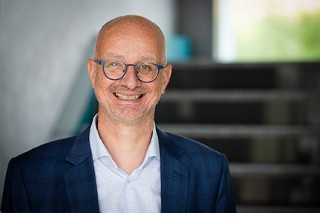State-of-the-art energy grids rely on renewable energies such as wind and solar power. However, the systems must deal with fluctuations both in power generation and in consumption. The grids therefore urgently require more dynamic storage systems in order to absorb the energy peaks and manage the increased demand for green power generation. The challenge is to optimise the capacity of such energy storage systems and guarantee a secure, cost-effective and sustainable energy supply. Smart combinations of storage systems, known as hybrid storage systems, offer a solution to this problem.
Efficient, sustainable and cost-effective hybrid storage system
The new hybrid storage system developed in the HyFlow project combines a high-power vanadium redox flow battery and a green supercapacitor to flexibly balance out the demand for electricity and energy in critical grid situations. A redox flow battery offers a large storage capacity, but is slow to charge and discharge. In contrast, the supercapacitor has short charging times with low storage capacities. Hybridisation has created an energy storage system that combines the advantages of both systems. Furthermore, in the project, the charging time of the redox flow battery has been reduced by 60 per cent.
There was a strong fundamental development during the project to achieve supercapacitor carbon electrodes from a sustainable local source, instead of the typical activated carbon from coconut shells. Researchers also focused on developing non-flammable, water-based electrolytes. This can reduce the carbon footprint of the new system by up to 40 per cent and its cost by up to 60 per cent compared with Li-ion batteries.
“It has been my dream to develop such a well-performing, cost-effective and, above all, environmentally friendly storage system, and through HyFlow this dream has become reality,” says Prof. Dr Karl-Heinz Pettinger, Scientific Director of the Technology Centre for Energy (TZE) at Landshut University of Applied Sciences, who coordinated the project.
Demonstrators at TZE of Landshut UAS and at Fraunhofer ICT
Interested stakeholders from industry, city utility companies, hospitals and data centres can now visit the new demonstrator developed in the HyFlow project at the Technology Centre for Energy (TZE) of Landshut University of Applied Sciences and feed in their load profiles to determine which storage systems they need to meet their electricity requirements.
In the HyFlow project, large-scale energy storage has already been demonstrated with a larger demonstrator located at the Fraunhofer Institute for Chemical Technology in Pfinztal near Karlsruhe.
The modelling of two use-cases has shown that the new storage system can offer a return on investment in less than four years. The storage system is comprised of individual components that are already in regular production by the project partners.
The HyFlow project partners have also developed advanced and more adaptable energy management systems for the new hybrid energy storage system.
About the EU project HyFlow
HyFlow was launched at the start of November 2020 and ran until the end of February 2024. The aim of the project was to develop an extremely powerful, sustainable and cost-effective hybrid energy storage system. The project has been realized by Landshut University of Applied Sciences in cooperation with nine further partners from Germany, Italy, Spain, Czechia, Austria and Portugal. It was led by Prof. Dr Karl-Heinz Pettinger, Scientific Director at the Technology Centre for Energy (TZE) of Landshut University of Applied Sciences. The European Union provided around four million euros in funding to the project through the Framework Programme for Research and Innovation “Horizon 2020”.
Following the end of the HyFlow project, the EU project SMHYLES was launched in January 2024, in which some of the HyFlow outcomes can be used and developed further. The objective of SMHYLES, which is funded as part of “Horizon Europe”, is to further develop and demonstrate innovative and sustainable salt- and water-based hybrid energy storage systems on an industrial scale. Among other things, the pilot plant developed in HyFlow is to be used and expanded.
 Fraunhofer Institute for Chemical Technology ICT
Fraunhofer Institute for Chemical Technology ICT
